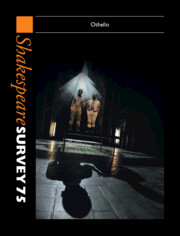Book contents
- Shakespeare Survey 75
- Shakespeare Survey
- Shakespeare Survey
- Copyright page
- Editor’s Note
- Contributors
- Contents
- Illustrations
- Understanding Iago, An Italian Film Adaptation Of Othello: Clientelism, Corruption, Politics
- Circumventing Marginality: The Curious Case Of India’s Othello Screen Adaptations
- Othello’s Kin: Legacy, Belonging And The Fortunes Of The Moor
- ‘More Fair Than Black’: Othellos On British Radio
- ‘This Fair Paper’: Othello And The Artists’ Book
- Othello: A Dialogue With The Built Environment
- ‘[A] Maid Called Barbary’: Othello, Moorish Maidservants And The Black Presence In Early Modern England
- ‘The Moor’s Abused By Some Most Villainous Knave, Some Base Notorious Knave, Some Scurvy Fellow’: Legal Spaces, Racial Trauma And Shakespeare’s The Tragedy Of Othello, The Moor Of Venice
- Ben Jonson’s Sejanus And Shakespeare’s Othello: Two Plays Performed By The King’s Men In 1603
- Iago And The Clown: Disassembling The Vice In Othello
- Pitying Desdemona In Folio Othello: Race, Gender And The Willow Song
- Desdemona’s Honest Friend
- Suffering Ecstasy: Othello And The Drama Of Displacement
- Othello’s Sympathies: Emotion, Agency And Identification
- Warning The Stage: Shakespeare’s Mid-Scene Entrance Conventions
- Looking For Perdita In Ali Smith’s Summer
- Grafted To The Moor: Anglo-Spanish Dynastic Marriage And Miscegenated Whiteness In The Winter’s Tale
- Rhyme, History And Memory In A Mirror For Magistrates And Henry VI
- ‘Bad’ Love Lyrics And Poetic Hypocrisy From Gascoigne To Benson’s Shakespeare
- Viola’s Telemachy
- New Analogical Evidence For Cymbeline’s Folkloric Composition In The Medieval Icelandic Ála Flekks Saga
- ‘But When Extremities Speak’: Harley Granville-Barker, Coriolanus, The World Wars And The State Of Exception
- Shakespeare Performances in England, 2021
- Shakespeare Performances in England, 2021
- Professional Shakespeare Productions In The British Isles, January–December 2020
- The Year’s Contribution To Shakespeare Studies
- 1. Critical Studies
- 2. Studies in Shakespeare in Performance, 2020–2021
- 3. Editions and Textual Studies
- Abstracts Of Articles In Shakespeare Survey 75
- Index
- References
2. - Studies in Shakespeare in Performance, 2020–2021
from The Year’s Contribution To Shakespeare Studies
Published online by Cambridge University Press: 24 August 2022
- Shakespeare Survey 75
- Shakespeare Survey
- Shakespeare Survey
- Copyright page
- Editor’s Note
- Contributors
- Contents
- Illustrations
- Understanding Iago, An Italian Film Adaptation Of Othello: Clientelism, Corruption, Politics
- Circumventing Marginality: The Curious Case Of India’s Othello Screen Adaptations
- Othello’s Kin: Legacy, Belonging And The Fortunes Of The Moor
- ‘More Fair Than Black’: Othellos On British Radio
- ‘This Fair Paper’: Othello And The Artists’ Book
- Othello: A Dialogue With The Built Environment
- ‘[A] Maid Called Barbary’: Othello, Moorish Maidservants And The Black Presence In Early Modern England
- ‘The Moor’s Abused By Some Most Villainous Knave, Some Base Notorious Knave, Some Scurvy Fellow’: Legal Spaces, Racial Trauma And Shakespeare’s The Tragedy Of Othello, The Moor Of Venice
- Ben Jonson’s Sejanus And Shakespeare’s Othello: Two Plays Performed By The King’s Men In 1603
- Iago And The Clown: Disassembling The Vice In Othello
- Pitying Desdemona In Folio Othello: Race, Gender And The Willow Song
- Desdemona’s Honest Friend
- Suffering Ecstasy: Othello And The Drama Of Displacement
- Othello’s Sympathies: Emotion, Agency And Identification
- Warning The Stage: Shakespeare’s Mid-Scene Entrance Conventions
- Looking For Perdita In Ali Smith’s Summer
- Grafted To The Moor: Anglo-Spanish Dynastic Marriage And Miscegenated Whiteness In The Winter’s Tale
- Rhyme, History And Memory In A Mirror For Magistrates And Henry VI
- ‘Bad’ Love Lyrics And Poetic Hypocrisy From Gascoigne To Benson’s Shakespeare
- Viola’s Telemachy
- New Analogical Evidence For Cymbeline’s Folkloric Composition In The Medieval Icelandic Ála Flekks Saga
- ‘But When Extremities Speak’: Harley Granville-Barker, Coriolanus, The World Wars And The State Of Exception
- Shakespeare Performances in England, 2021
- Shakespeare Performances in England, 2021
- Professional Shakespeare Productions In The British Isles, January–December 2020
- The Year’s Contribution To Shakespeare Studies
- 1. Critical Studies
- 2. Studies in Shakespeare in Performance, 2020–2021
- 3. Editions and Textual Studies
- Abstracts Of Articles In Shakespeare Survey 75
- Index
- References
Summary
When Pascale Aebischer’s Shakespeare, Spectatorship and the Technologies of Performance was published in 2020, the first lockdown in response to the COVID-19 pandemic was already in place in the UK. In the light of these circumstances, in Viral Shakespeare in the Cambridge Elements series (2021), she reflects on her ‘responses to some of the unique spectatorial configurations, novel experiences and creative innovations that emerged in the time of the pandemic’ (8). The result is a remarkable personal account of the ‘fleeting insights and experiences garnered from watching Shakespeare in lockdown’, which are ‘worth preserving because they speak to a moment of unprecedented intensity and emotional rawness that is profoundly marked by Shakespeare’ (11). ‘Viral’ is, of course, a metaphorical adjective in the digital world that has acquired a distinctive resonance since the beginning of 2020. Aebischer describes an important consequence of the sudden abundance of Shakespeare performances available online: ‘The broadcasts intersect and impact one another so that precursors turn into successors, what follows after can change the meaning of what comes before, and dialogues between productions defy the laws of chronology. The linearity of succession makes way for viral interpenetration, as contagion travels freely between any broadcasts that come into contact’ (25).
- Type
- Chapter
- Information
- Shakespeare Survey 75Othello, pp. 375 - 383Publisher: Cambridge University PressPrint publication year: 2022



